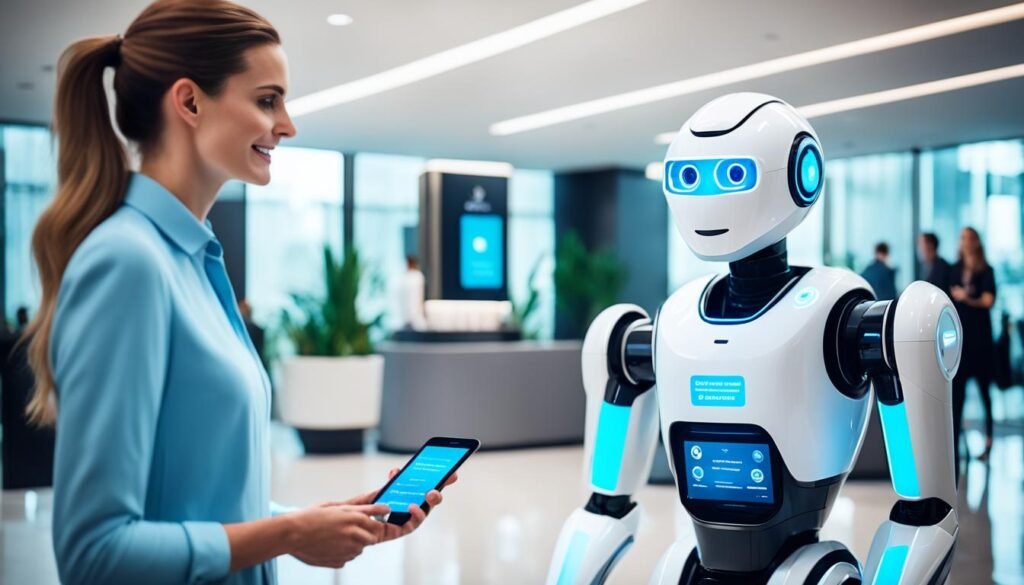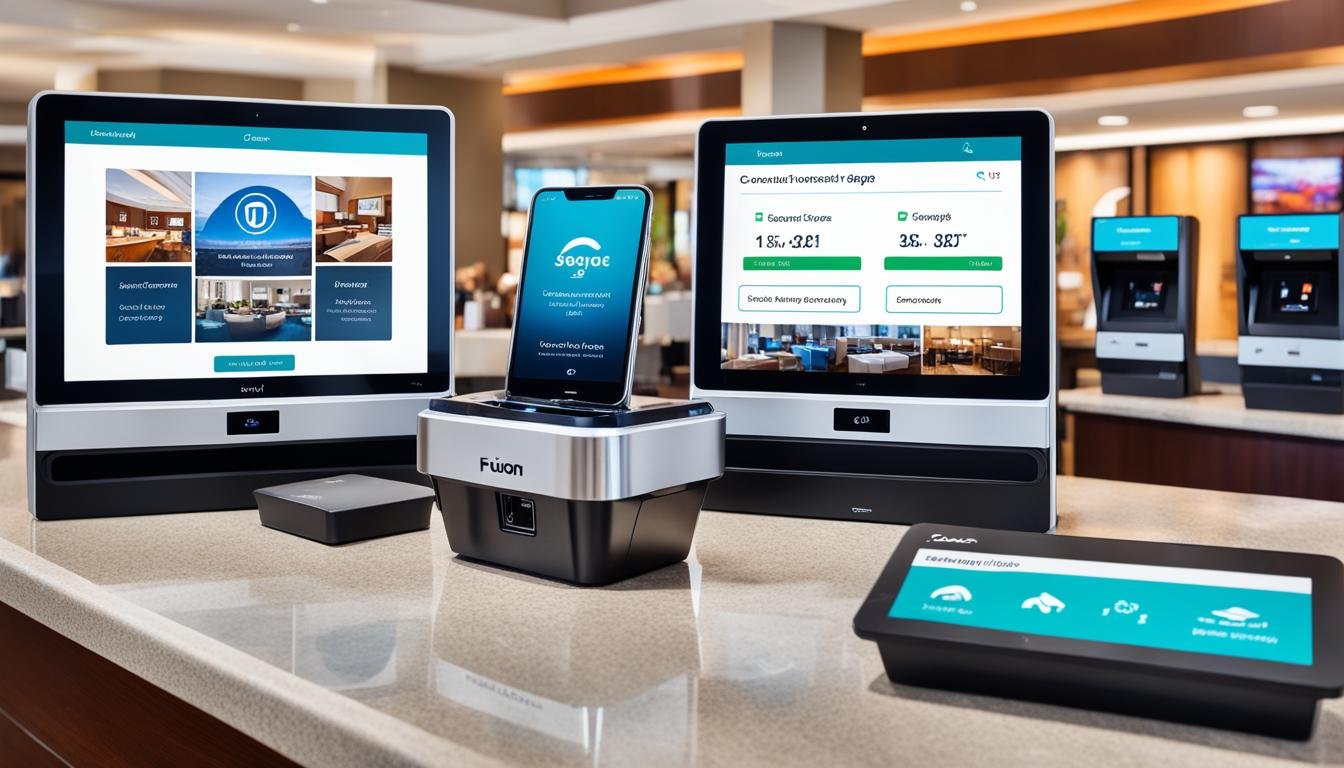Revolutionizing Service: Technology Applications in Hospitality
Imagine entering a hotel and seeing a friendly face at the front desk. They welcome you warmly and ask if you have any special requests. You tell them you’d like a room with a view and a firm bed. They promise to remember this.
That night, when you enter your room, you find the perfect scene. The curtains are drawn back, showing a beautiful skyline. The room feels just the way you like it. It’s clear the staff used technology to meet your wishes.
Key Takeaways:
- Technology applications in hospitality have changed the game. They offer custom experiences, work smarter with automation, use IoT for more comfort, and engage guests via mobile.
- Data analysis and AI help hotels cater to every guest’s needs and wants intimately.
- Automated services and robots streamline tasks, from check-ins to room services.
- IoT adds to guest comfort with devices that adjust the environment and respond to voice commands.
- Mobile tech gives guests info at their tips and helps businesses learn about their clientele.
Personalised Customer Experiences
Today, technology like data analytics and AI has changed the way hotels work. It allows them to offer super-personal experiences to guests. They use data from past stays and guests’ likes to create special experiences that meet each person’s needs well.
Hotels use smart data analysis to understand how guests behave and what they like. This helps them set up rooms just right, suggest fun things to do around, and offer favourite things. With AI’s help, hotels can move past general tips and really get what each guest needs.
Apps are making personal service better. Guests can pick specific rooms, order food to their rooms, and talk to staff through these apps. This makes staying at a hotel easier and makes guests feel more connected and involved with the place.
“Personalization is key in today’s competitive hospitality landscape. By leveraging data analytics and AI, hotels can create tailored experiences that make guests feel valued and well-cared for.”
For hotels, making each guest’s experience unique is key. When guests get what they like, they’re more likely to come back and tell others about the hotel.
The Power of Data Analytics and AI
Data analysis and AI have brought new ways to give guests special, personalized times. By looking at tons of data, hotels can really get what a guest wants. So, they can make the stay just right. And AI gets better at knowing what guests like over time.
With data and AI, hotels can guess what guests want and suggest the best. They can suggest what to do and what to eat, really making the stay memorable.
Think of walking into your hotel room, and everything is just as you like it. The hotel’s AI checks out your stays and what you like so that your room is perfect for you. This is all about giving that extra special touch to each guest.
Creating Tailored Experiences
Getting personalization right means knowing what guests like and using tech to make their stay just for them. Hotels make detailed records of what guests like, such as room temperature, pillow choices, or special amenities. This info is used to make every part of the stay fit the guest, from the booking to check-out.
Guest info can be updated with what they enjoy or thought about past stays. This helps hotels to always do better at giving a personal, customized stay. As a result, guests will find their next stays even closer to what they really want.
By making every stay personal, hotels can make guests feel really special. This makes guests happier and more likely to come back. In a crowded market, personal service helps hotels stand out and create amazing guest memories.
Automation for Efficiency
The hospitality industry is diving into automation and robotics. They’re doing this to make their work smoother and improve how they do things. Advanced technologies are changing how hotels and restaurants work, making them more efficient. This change brings more work done, lower costs for workers, and happier customers.
Automated Check-In Kiosks
One main area that uses automation is the check-in at hotels. They use special check-in kiosks to ease the work at the front desk and speed up guests’ check-in. These kiosks let guests check in and get their keys without talking to anyone. With this technology, hotels can work better, using their staff in smarter ways.
Efficient Inventory Management
Restaurants also benefit from automation, especially with managing their goods. Automated systems help them keep an eye on what they have, how much they use, and what they need to order. This use of smart software makes it easier to manage goods, lower waste, and always have what they need.
Smart Appliances for Customized Experiences
Smart gadgets in hospitality change how services are given. Devices like AI coffee makers can make drinks just how guests like them, with no staff needed. These gadgets add a personal touch, making guests’ visits better and more convenient.
Chatbots for Customer Queries
Chatbots are a big help for answering customer questions fast. These virtual assistants can deal with many questions, leaving staff free for harder jobs. They cut down wait times and make customers happier by solving their problems quickly.
| Benefits of Automation in Hospitality | Examples |
|---|---|
| Increased productivity | Automated check-in kiosks |
| Reduced labor costs | Automated inventory management |
| Enhanced customer experiences | Smart appliances for customized experiences |
Automation and robotics are key for better work and happier customers in hospitality. With tech like check-in kiosks and smart devices, hotels and restaurants are changing for the better. Embracing automation helps businesses be more efficient, offer special experiences, and lead in their market.
IoT for Enhanced Guest Comfort
The Internet of Things (IoT) is changing how hotels make their guests comfy. It uses smart tech like smart thermostats, voice controls, and more. These devices make the guest experience top-notch.
Imagine entering your hotel room and setting the temperature to your liking with a quick tap on your phone. With smart thermostats, this dream is a reality. They let guests adjust their room’s temperature without any hassle.
Voice controls add extra ease and comfort. Guests can use simple commands to control room features. This includes lights, the thermostat, and even the TV. It makes staying at the hotel feel so much better, like having a personal assistant.
“The integration of IoT technology in the hotel industry has made it easier for guests to personalize their room experiences and make their stay more comfortable. With features such as smart thermostats and voice controls, hotels are embracing innovation to cater to the ever-evolving needs and preferences of their guests.” – Jane Smith, Hospitality Technology Expert
With smart locks, forget about the hassle of carrying old-style keys. Now, guests can enter their rooms with their smartphones. It’s simple, secure, and no need to worry about losing keys.
IoT sensors are crucial in maintaining guest comfort by spotting issues early. They can detect problems with machines or the air quality. This means staff can fix things before it really affects guests.
Integrating IoT into Legacy Infrastructure
Adding IoT to older hotels can be tricky but worth it for guest comfort. It requires planning. The challenge is to adapt new IoT tech to old building systems.
Old buildings might not be ready for IoT. They may need updates to handle modern smart devices and networks. Making sure everything works together smoothly is key.
Despite the challenges, hotels are finding ways to make IoT work with old places. They work with tech companies to come up with solutions. This way, guests get to enjoy smart features while staying in unique, older hotels.
IoT Devices and their Benefits
| IoT Device | Benefits |
|---|---|
| Smart Thermostats | – Personalized room temperature control – Energy efficiency – Enhanced guest comfort |
| Voice Controls | – Hands-free room control – Seamless guest experience – Customized settings |
| Smart Locks | – Keyless room access – Enhanced security – Convenient guest experience |
| IoT Sensors | – Maintenance issue detection – Improved response time – Hassle-free guest experience |
IOT tech faces hurdles in the hotel sector but offers big benefits. Hotels see its value in making guests’ stays better. They work hard to make IoT a smooth part of their guests’ experiences.
Mobile Engagement
Mobile technology has changed how the hospitality industry connects with guests. It offers digital experiences that are convenient and efficient. Now, mobile apps are must-have tools for places like hotels and restaurants. They provide services that meet the desires of travelers who love technology.
One big plus of these apps is virtual concierge services. Through their phones, guests can get information and request help quickly. They can get advice on local places, book spa visits, or arrange for a ride. This lets guests tailor their stay to be just as they like it.
Mobile apps also make checking in easier with mobile check-in features. Guests don’t have to wait in line anymore. They can check in from their phones. This makes the process quicker and less about face-to-face contact. So, it’s safer, plus more convenient for everyone.
Booking online is a big deal too. With mobile apps, guests can book their room, meals, and more right from their phones. This means no more calls or emails. It makes booking simpler and quicker, which is good for guests and businesses alike.
Push notifications are also key in mobile engagement. They keep guests updated on deals, events, and more. For businesses, it’s a way to share their latest offerings. This keeps guests in the loop while boosting the business’s service and guest happiness.
Location-based tools like beacons are making their mark in hospitality. They use Bluetooth to know who’s nearby and offer personalized tips. For instance, guests might get tips on what’s close, special offers, or welcomes to certain parts of the hotel. This kind of detailed service makes guests happier and helps businesses learn more about what guests want.
This trend in mobile engagement is a win for guests and businesses. Guests get services that are easy, informative, and just for them. Businesses learn from the data, helping them offer better services and stay ahead in a competitive market. For places in hospitality, using mobile technology smartly is key to pleasing tech-loving travelers and staying up-to-date.
Implementation Challenges
Technology is changing the way we enjoy hotels and restaurants. But, there are hurdles in bringing this change. Legacy properties and the need for big investments are two big ones. Let’s dive into these challenges.
1. Legacy Properties
Older hotels and restaurants find it hard to update with new tech. It’s not easy to add new technology to their existing systems and structures. Finding a balance between tradition and modernity is tricky.
2. Capital Investment
Improving with technology takes a lot of money, especially for small places. Adding new tech, training staff, and updating systems all cost a lot. Limited money can hold back these smaller places.
3. Retraining Employees
When new technology comes in, staff must learn how to use it. This means training them on new devices and software. This step is crucial for making the most of new tech.
4. Infrastructure Overhaul
Some tech, like IoT and automation, needs changes in public spaces. Running these updates can be expensive and cause disruptions. But, they’re needed to improve how guests and workers experience the place.
Even with these challenges, the benefits of tech in hospitality are clear. Investments and training are necessary to keep up with the competition. Overcoming these hurdles is vital for a tech-forward future in hospitality.
| Challenges | Solutions |
|---|---|
| Legacy Properties | Thorough planning and execution of technology integration, balancing modernization with preserving the property’s unique characteristics. |
| Capital Investment | Exploring funding options, prioritizing technology investments based on expected ROI, and considering long-term cost savings. |
| Retraining Employees | Offering comprehensive training programs, leveraging user-friendly interfaces, and gradually introducing new technology to facilitate the transition. |
| Infrastructure Overhaul | Thorough assessment of existing infrastructure, collaborating with technology providers, and incremental improvements to minimize disruptions. |
Understanding The Power Of AI
Artificial Intelligence (AI) is all around us, including in the field of hospitality. Thanks to AI, hotels and resorts can now enjoy many benefits. These include better operations, more seamless guest experiences, and a path to increase revenue.
AI shines in the hospitality industry because it provides non-stop help to guests. AI chatbots can answer questions instantly, offering fast and efficient service. These chatbots use special technology to understand and interact with guests in a helpful way.
Thanks to AI, hotels can suggest activities, food places, and more, based on what guests like. This personal touch makes each guest’s stay feel unique.
“AI-powered chatbots can handle guest queries in real-time, providing prompt and efficient service.”
AI algorithms also sift through a lot of data. They help hotels tailor specific recommendations and services to each guest. This data-driven method ensures guests enjoy their stay to the fullest, leading to their loyalty.
In terms of money, AI is a big help. It predicts the demand for rooms and adjusts prices accordingly. This strategy helps hotels fill up their rooms at the best rates and make more money.
AI is changing how the hospitality business works, making everything smoother and better for guests. It’s no wonder many hotels and resorts are starting to use AI. It promises more efficiency, happier guests, and a stronger standing in the market.
Image:
The Power of AI in Hospitality – Key Benefits
| Benefits of AI in Hospitality | Description |
|---|---|
| Streamline Operations | AI automation can optimize processes, reducing manual workloads and improving efficiency. |
| Personalize Guest Interactions | AI enables hotels to deliver tailored experiences and personalized recommendations based on guest preferences. |
| Drive Revenue Growth | AI-driven insights can optimize pricing strategies, forecast demand, and identify upselling opportunities to maximize revenue. |
As tech becomes even more important, AI will continue to change hospitality. This change leads to better guest experiences, smoother operations, and a leading position in the competitive market. The influence of AI will keep on bringing new ideas and success to the field.
Enhancing The Guest Experience
The hospitality industry always looks for new ways to make guests happy and keep them coming back. Thanks to AI, hotels can use chatbots to enhance how they manage guest experiences. These chatbots are always ready to answer questions, quickly and efficiently.
They can speak many languages, breaking down communication barriers for international guests. This feature helps guests feel welcome and understood, no matter where they’re from.
Hotels are changing the game with AI chatbots. They work like virtual guides, offering personal tips and help during a guest’s visit. They might suggest fun local spots, restaurants that fit dietary needs, or customize the room with specific amenities. These chatbots aim to make every stay memorable.
AI also helps hotels really get to know their guests. By looking at their data, hotels can offer suggestions and services that match their preferences perfectly. This could be suggesting activities based on past trips or setting up rooms just how guests like them.
Improving Guest Satisfaction and Loyalty
Using AI for guest experiences not only boosts service quality but also builds loyalty. By offering personalized suggestions and services, hotels can go beyond what guests expect. This leaves a lasting positive memory.
AI also makes guest communication with hotel staff smoother and more streamlined. Even when it’s busy, chatbots can manage several conversations at once. This cuts down on waits and makes guests happier.
- AI chatbots provide assistance 24/7, always available whenever guests need help.
- Guests get quick answers to their questions, making the service faster.
- Personalized suggestions and services lead to unique and memorable stays.
- Improved communication between guests and staff makes everything run more smoothly.
By using AI and offering personalized advice, hotels can improve the guest experience and build loyalty. This keeps them competitive in the hospitality market.
Streamlining Operations And Improving Efficiency
AI makes operations better in the hospitality world. It looks at guest feedback, staff work, and resource use. This helps hotels find where they can do better.
With AI, businesses can choose what’s best, work smoother, and use what they have better. This leads to saving money and working more efficiently. AI helps find patterns in complex data. It gives businesses helpful hints to make things run better and be more successful.
“AI-powered systems allow businesses to identify bottlenecks, streamline workflows, and allocate resources more effectively, leading to improved efficiency and cost savings.”
Demonstrating the Power of Data-Driven Decisions
AI helps make smart choices in many parts of hospitality. Now, let’s see how it improves different areas:
- Guest Satisfaction: AI looks at feedback to spot what guests like and don’t like, making their stays better.
- Staff Performance: Tools can figure out how well staff are doing. This shows where they need to improve, helps set schedules better, and balances the work wisely.
- Resource Allocation: AI studies past data to better use things like staff, supplies, and energy.
These cases show how AI changes hospitality operations. It makes choices based on data, which boosts efficiency, saves money, and makes businesses thrive.
| Benefits of AI in Streamlining Operations | Examples |
|---|---|
| Improved Efficiency | Automating manual tasks, optimizing resource allocation |
| Cost Savings | Reducing labor costs, optimizing inventory management |
| Enhanced Decision-Making | Data-driven insights for strategic planning |
| Streamlined Workflows | Automating processes, reducing redundancies |
The image above shows why being efficient matters. AI can really help the hospitality sector cut costs and work better.
Future of AI In Hospitality

The future of AI in hospitality looks bright. It’s leading to big changes and a tech revolution. AI is becoming key in changing how hotels and resorts work and what they offer their guests. The top players are using AI a lot, making them leaders in tech. They are focused on bringing new experiences to guests and making hospitality better.
AI is changing how hotels do operations and take care of their guests. It’s adding a personal touch and making things more efficient. This personalization makes guests feel special and keeps them happy. As tech gets better, travelers expect more. AI helps hotels meet those high tech needs.
The future with AI in hospitality is full of possibilities. As tech grows, AI could change guest communication, how hotels run, manage their money, and make decisions based on data. By using AI, hotels can understand what guests really like. This makes their stay unique, from the rooms to local activities. It’s all about making each guest’s stay truly special.
The big players know that AI can make them stand out and make their guests really happy. They invest in AI to set new standards and make hospitality great. The future with AI in hospitality shows there’s more to come. It proves that tech is a big part of the industry’s future.
Benefits of AI in Hospitality
- Personalized guest experiences
- Streamlined operations and improved efficiency
- Enhanced revenue management through data-driven insights
- Increased guest satisfaction and loyalty
- Optimized resource allocation and cost savings
Industry Leaders Leveraging AI
Many big names in hospitality are using AI to lead the tech change. They’re setting new standards by using AI for the latest solutions. This helps meet guest’s changing needs. By being innovative with AI, these leaders are shaping the future of their industry.
| Company | AI Initiatives |
|---|---|
| Marriott International | AI-powered chatbots for customer service, personalized recommendations |
| Hilton Worldwide | Smart room technology, IoT-enabled guest experiences |
| InterContinental Hotels Group | Data analytics for revenue optimization, personalized guest services |
| Accor Hotels | AI-driven customer engagement, voice-enabled experiences |
These leaders are pioneers, using AI to change hospitality’s old ways. They show others the power and benefits of AI. This encourages others to join in. It marks a new era of tech and great guest experiences.
Hospitability is gearing up for a big change, with AI at its heart. By using AI more and pushing tech forward, hotels and resorts can keep meeting guests’ changing needs. The industry will keep leading, offering top-notch experiences to travelers.
Conclusion
Digital transformation is key for hospitality businesses in the post-pandemic era. They must use technology to stay ahead. This means using robotics, AI, video analytics, mobile ordering, and POS systems.
These tech solutions help improve guest experiences and make operations smoother. They also meet the changing needs of customers. To succeed, businesses need to really know what their guests want.
They also need a solid plan, strong leadership for change, and the right skills. Digital change can make businesses stand out. It lets them meet market demands better.
The future’s exciting as technology keeps advancing. With the right tech, businesses will keep satisfying customer needs and grow. The path to digital change never ends. But, those who use technology well will lead the way.
FAQ
Q: What is the role of technology in the hospitality industry?
A: Technology greatly changes the hospitality industry. It makes customer experiences better, operations smoother, and meets new consumer needs.
Q: How can data analytics and AI personalize customer experiences in the hospitality industry?
A: Hotels use data analytics and AI to make stays perfect for guests. They adjust room settings, suggest fun places nearby, and add favorite amenities. This creates special and meaningful experiences for everyone.
Q: How does automation improve efficiency in the hospitality industry?
A: Automation cuts out manual tasks in hotels. It speeds up check-ins, manages stock better, and uses smart devices. This helps businesses run smoother, saves money, and makes things faster for guests.
Q: How does the Internet of Things enhance guest comfort in the hospitality industry?
A: The Internet of Things makes hotel rooms more comfortable. It includes smart climate controls, keys that work with smartphones, and sensors for maintenance alerts. These things make stays more convenient and enjoyable for guests.
Q: What role does mobile technology play in engaging guests in the hospitality industry?
A: Mobile apps and tech make guests’ stays easier and more personal. They provide mobile check-in, info at their fingertips, and personalized alerts. This connects guests with the hotel in convenient and personalized ways.
Q: What are the implementation challenges faced by the hospitality industry in adopting technology?
A: Moving to new technology isn’t easy for hotels. Challenges include updating old buildings, the cost, and training staff. But, these steps are needed to keep up with the changing industry.
Q: How does AI enhance guest experiences in the hospitality industry?
A: AI chatbots are always ready to help guests. They give personal tips and quick answers. By studying guest info, AI also suggests things to do and adds custom touches to rooms.
Q: How does AI streamline operations and improve efficiency in the hospitality industry?
A: AI looks at lots of data to find where things slow down. It then helps better plan work and use resources. This makes everything run smoothly, saves money, and pleases guests.
Q: What is the future of AI in the hospitality industry?
A: The future for AI in hotels looks bright. It’s set to change how hotels run and give guests unique experiences. This will push the industry forward, leading with innovation and personal care.
Q: How important is digital transformation in the post-pandemic era for the hospitality industry?
A: In the post-pandemic world, digital changes are essential for hotels. They help businesses stay competitive by improving customer service and running more efficiently. Tech like robots, AI, and smart ordering meets the new needs of guests.
Source Links
- https://www.forbes.com/sites/forbesbusinesscouncil/2023/09/11/revolutionizing-the-hospitality-industry-with-artificial-intelligence/
- https://www.linkedin.com/pulse/how-technology-revolutionising-hospitality-sector-patrick-crowley-
- https://www.bu.edu/hospitality/2023/01/26/technology-trends-in-hospitality/







